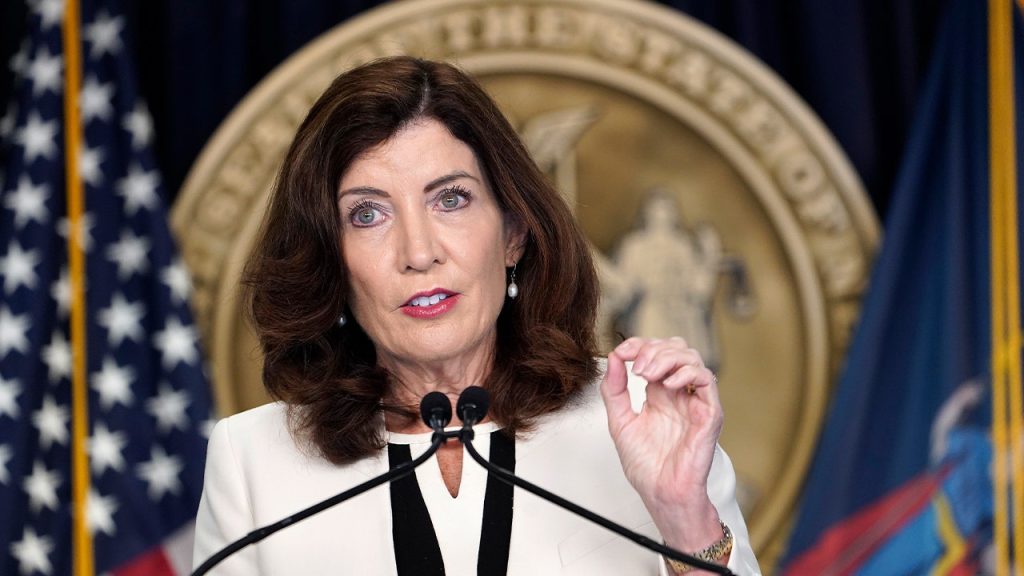The Climate Change Superfund Act, recently signed into law by New York Governor Kathy Hochul, aims to hold fossil fuel companies accountable for their contribution to climate change by charging them up to $75 billion for pollution dating back to 2000. This revenue will purportedly be used to fund infrastructure projects aimed at mitigating the impacts of climate change-related weather events. While proponents laud the legislation as a step towards environmental justice and fiscal fairness, critics argue that it will ultimately harm working families and businesses through increased energy costs. This debate highlights the complex economic and social implications of ambitious climate action initiatives.
Critics of the legislation, including energy experts and economists, contend that the costs imposed on energy companies will inevitably be passed down to consumers in the form of higher energy prices. This regressive impact, they argue, will disproportionately burden low- and middle-income families in a state already known for its high cost of living. Furthermore, they predict that the increased costs will drive businesses and residents out of New York, seeking more economically competitive environments. This exodus could lead to a decline in state revenue, exacerbating the economic challenges the legislation intends to address. These critics argue that the focus on penalizing energy producers, rather than incentivizing innovation and adaptation, represents a counterproductive approach to climate action.
Opponents of the bill also criticize the underlying principle of retroactively holding companies accountable for pollution based on past standards. They argue that this approach creates uncertainty and disincentivizes investment in the energy sector. Furthermore, they highlight the potential legal challenges this retroactive application may face. Some critics frame this legislation within a broader narrative of government overreach and ideological motivations, suggesting that it reflects a prioritization of progressive ideals over practical economic considerations. They argue that policies like this, which increase costs for consumers and businesses, ultimately diminish the standard of living for ordinary citizens while offering little tangible benefit.
Proponents of the legislation, on the other hand, emphasize the need to hold fossil fuel companies accountable for the environmental and economic damage caused by their emissions. They argue that these companies have profited from activities that have contributed to climate change, and therefore should bear the responsibility for the costs of adapting to its impacts. The Climate Change Superfund Act, in their view, represents a crucial step toward achieving environmental justice by ensuring that those who have contributed most to the problem are also contributing to the solution. They view this legislation as a mechanism for achieving fiscal fairness, shifting the financial burden of climate change adaptation away from taxpayers and onto the companies responsible for the pollution.
The legislation’s supporters point to the increasing frequency and intensity of extreme weather events, such as hurricanes and floods, as evidence of the urgent need for climate action. They argue that investing in infrastructure resilience is essential to protect communities and minimize the economic disruption caused by these events. The Climate Change Superfund Act, they suggest, provides a dedicated funding source for these critical infrastructure projects, ensuring that New York is prepared to withstand the challenges of a changing climate. They maintain that addressing climate change is not only an environmental imperative but also an economic one, as the costs of inaction are likely to far exceed the costs of implementing climate mitigation and adaptation measures.
The Climate Change Superfund Act represents a significant development in the ongoing debate over how to address the complex challenges of climate change. The diverging perspectives on this legislation highlight the inherent tensions between economic considerations and environmental goals. While proponents emphasize the need to hold polluters accountable and invest in climate resilience, critics raise concerns about the potential economic consequences and the fairness of retroactive penalties. The ultimate impact of this legislation remains to be seen, but it undoubtedly sets a precedent for other states grappling with the challenge of funding climate action initiatives. The implementation of this act and its subsequent effects will likely be closely monitored nationwide as a potential model or cautionary tale for similar legislative efforts.















